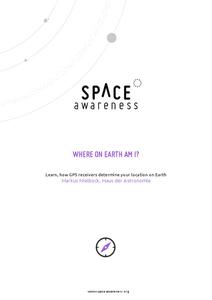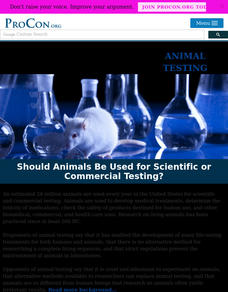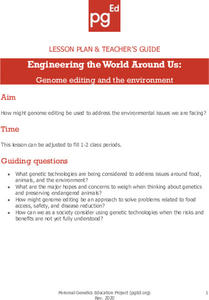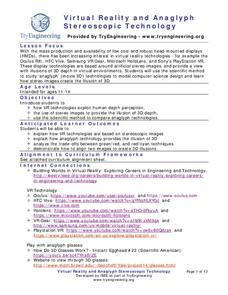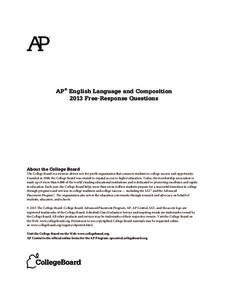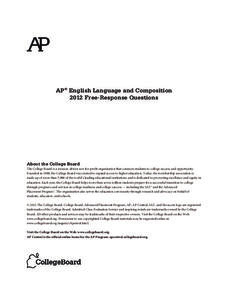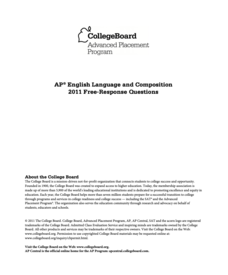University of Colorado
Are All Asteroids' Surfaces the Same Age?
There are more than 600,000 asteroids in our solar system. Pupils analyze images of two asteroids in order to determine if they are the same age. They count craters for each asteroid and compare numbers.
University of Colorado
Can Photosynthesis Occur at Saturn?
In the 19th activity of 22, learners determine if distance from a light source affects photosynthesis. Participants capture oxygen in straws and find that the amount of water the gas displaces is proportional to the rate of photosynthesis.
LABScI
Conservation of Momentum: Marble Collisions
What happens to the momentum of an object when it strikes another object? Scholars roll a marble down a ramp so it collides with another marble. By measuring the speed of each marble before and after the collision, pupils answer this...
LABScI
Acoustics: The Sound Lab
If the delay between a sound and its echo is less than 1/10th of a second, the human ear can’t distinguish it. Through the use of a Slinky, rubber band guitar, and straws, scholars explore where sound comes from and how it travels. Whole...
Cornell University
Constructing and Visualizing Topographic Profiles
Militaries throughout history have used topography information to plan strategies, yet many pupils today don't understand it. Scholars use Legos and a contour gauge to understand how to construct and visualize topographic profiles. This...
LABScI
DNA Structure: Gumdrop Modeling
DNA molecules hold the secrets that make us unique. The fourth of 12 lessons explores the structure of DNA by building candy models. After building the models, young scientists break their models to begin the process of DNA replication....
Space Awareness
Where on Earth Am I?
Almost every phone has GPS installed, but a large number of teens don't know how the technology works. An initial activity illustrates how GPS determines a location on Earth. Scholars then apply trilateration procedures to a...
LABScI
The Rutherford Atomic Model: Hidden Obstacles
Historically, scientists had to be creative to study subatomic structure. Scholars step into their minds to recreate the procedure Rutherford used to create his atomic model. Learners identify the creative efforts of early scientists...
NET Foundation for Television
1850-1874 The Kansas-Nebraska Act
How the Kansas-Nebraska Act created Bleeding Kansas is complicated—until scholars research and examine documents from the time. After completing activities that include mapping, photo, document analysis, and discussion, learners...
Curated OER
Animal Testing
Animal testing: cruel and inhumane, or innovative and life-saving? Scholars explore the topic and form their own opinions with help from the highly informative website. Pupils read a comprehensive overview of the topic, including...
Personal Genetics Education Project
Engineering the World Around Us: Genome Editing and the Environment
Challenge young minds to build a better world with genetic engineering. Biologists learn potential solutions for environmental issues using genome editing while interacting with three case studies. Scholars read articles and view...
Scholastic
Drones Take Off
Ever wonder what drones are doing high above us in the sky? This article gives your class an insight to what those robots in the sky are doing. After reading an article on drone technology, pupils are prompted to respond to a variety of...
Institute of Electrical and Electronics Engineers
Virtual Reality and Anaglyph Stereoscopic Technology
Experiment with 3-D glasses to learn about stereo images and virtual reality. Scholars look at various images to determine if green/red or red/cyan glasses are preferable. They determine distances between images using the 3-D glasses and...
Centers for Ocean Sciences
Ocean and Great Lakes Literacy: Principle 7
Your mission, should you choose to accept it, is to take your class on an underwater adventure. The final installment in a seven-part series involving salt and freshwater bodies takes junior oceanographers below the surface in...
Kenan Fellows
Ready, Set, Save on Solar Energy Technology!
Does your class have a bright future in the solar energy industry? Science scholars take an in-depth look at what's new in solar technology. After completing research into the solar industry, participants create and market a product in...
College Board
2017 AP® United States History Free-Response Questions
Were unfair taxes really the cause of the American Revolution? Learners explore the complicated historiography behind the revolutionary period using authentic College Board prompts. The free-response questions from the exam feature...
College Board
2018 AP® English Language and Composition Free-Response Questions
Discussions of eminent domain sometimes trigger strong emotions. A set of free-response questions from the 2019 AP® English Language and Composition exam tackles the concept with a series of persuasive pieces. Learners analyze all six...
College Board
2017 AP® English Language and Composition Free-Response Questions
In the age of the Internet, are libraries still important? A collection of sources, part of a set of sample free-response questions from the AP® English Language and Composition exam, discuss that question. A variety of sources,...
College Board
2013 AP® English Language and Composition Free-Response Questions
In 2011, the Martin Luther King, Jr. Memorial opened in Washington, DC to much praise and some criticism. Part of a series of response questions from the AP® English Language and Composition exam, writers consider what factors should...
College Board
2014 AP® English Language and Composition Free-Response Questions
For some students, college may not be worth the cost. Free-response questions from the 2014 AP® English Language and Composition exam cover a variety of topics, including the value of a college education. Writers review six sources to...
College Board
2012 AP® English Language and Composition Free-Response Questions
Neither rain nor snow nor heat nor gloom may keep postal workers from delivering the mail, but is their livelihood sustainable? A question about the USPS makes up one of the three items in a series of free-response questions from the...
College Board
2016 AP® English Language and Composition Free-Response Questions
When it comes to testing, practice makes perfect. A set of free-response questions from the AP® English Language and Composition exam help writers prepare for the test. Three different prompts cover topics such as monolingual English...
College Board
2015 AP® English Language and Composition Free-Response Questions
Many schools have honor codes, but scholars do not always choose to follow them. As part of a series of free-response questions from the AP® English Language and Composition Exam, learners discuss the benefits or disadvantages of honor...
College Board
2011 AP® English Language and Composition Free-Response Questions
Mammals can be carnivores, omnivores, and herbivores, but what about locavores? A set of free-response questions from the 2011 AP® English Language and Composition exam introduces test-takers to the term, which describes people who try...
Other popular searches
- Advanced Algebra Worksheets
- Advanced Algebra
- Advanced French Vocabulary
- Esl Advanced Vocabulary
- Advanced Grammar Lessons
- Advanced Word Processing
- Advanced Manufacturing
- Esl Conversation Advanced
- Computer Vocabulary Advanced
- Advanced Spanish
- Advanced Esl
- Advanced Placement








